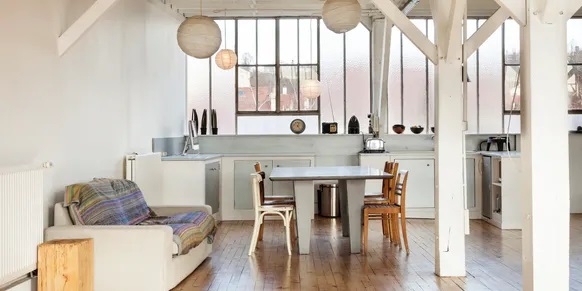With many Americans spending a lot more time at home, you may find your house taking on the roles of office, classroom, gym and community center — and it’s easy to feel uninspired by your surroundings after occupying the same space day in, day out. But all hope is not lost: There are simple and inexpensive ways to transform your home into a fresh and stimulating environment.
Give your home some TLC with these seven tips from interior decorators.
Break it up
If you’re working at home, it’s easy to feel overwhelmed by conflicting responsibilities. To help stay on track, designate different areas for specific activities. “It’s important to ‘compartmentalize’ your living space,” says Harry Heissmann, an interior designer based in Brooklyn, NY. Now working remotely from his apartment with his partner and their pup, Heissmann has assigned specific areas for fitness, work and leisure: “We dug out a yoga mat from under the bed and dedicated an area to working out. The desk in the living room was cleaned and organized and serves as a ‘command station’ for going online and making phone calls. The bedroom doubles as another workspace and is perfect for napping or watching movies in bed.” If you live in a studio, you can simulate separate “rooms” by splitting up the space with curtains, bookshelves or other furniture.
Experiment with color
Painting the walls is one of the cheapest and easiest ways to immediately invigorate any home. For a classic look that will hold up against almost any decor, opt for cool neutrals; if you prefer something more dramatic, consider adding a pop of color to a feature wall. Reiko Gomez, a feng shui expert and interior designer in the Hamptons, NY, recommends greens and blues: “They are most associated with health, calm and well being.” If you’re not ready to commit to paint, Gomez suggests using accessories like throw pillows, an area rug, curtains or artwork to bring color into your space.
Streamline and declutter
With millions of us now living and working alongside family members, significant others and roommates, our homes may suddenly seem more cramped than ever before. According to Gomez, there’s no better way to create spatial harmony than decluttering: “It works a powerful magic in that it gets your entire space up to speed with you.” She recommends starting small with a contained space like a bathroom, which “will give you a quick feeling of accomplishment and encourage you to do the next space.” The benefits of a tidy space extend beyond aesthetics — research has found that clearing clutter can lower stress levels.
Do a digital detox
The digital detox movement is not new, but it’s worth revisiting in this climate of constant COVID-19 news and social media chatter. Though it’s important to stay informed about the health crisis, it’s easy to slip from a healthy level of engagement to compulsive checking. To reduce screen dependence, set up manageable boundaries based on time or place. For example, designate dinnertime as phone-free, or remove mobile tech devices from your bedroom for a daily reset.
Invigorate with scents
Scent is a powerful vehicle for uplifting your mood. According to Mindy Yang, the owner of Perfumarie, a fragrance lab in SoHo, NY, “Every room should have a different scent track to score your moment.” Yang uses woody scents like cedar, palo santo, oud, copal and frankincense to feel grounded; rosemary for invigoration; and incense to focus and meditate. There are many ways to suffuse a room with scent — candles, oil diffusers, air mists and fresh flowers, to name a few. For a more subtle effect, crack open a window to balance out your chosen fragrance with fresh air.
Greenify and purify
While you’re staying put, there’s no better time to bring the outside world in. Summer Rayne Oakes, host of Plant One On Me, says, “If there’s one thing that makes a space feel livable, it’s some elements of green.” Not only do plants bring light and color, they also add oxygen to your home — something that many of us could use more of as we hunker down indoors. Consider the level of care you want to give: “Some folks may find something less fussy to be easier to deal with, whereas others may want a more ‘high-maintenance’ plant that requires attention every day.” Whichever plant you choose, she says that the ritual of maintaining it can be deeply healing.
Lighten up
Natural light is the top office perk, according to a study of workplace benefits published in the Harvard Business Review. If your home is now your office, you have more control than ever over the light conditions of your workday. To maximize your exposure to natural light, position your desk near a window and keep drapes and shades open during the daytime. If you don’t have much natural light coming in, Heissmann recommends affixing aluminum mini-blinds to your windows: “You can direct or cut out light (and inquisitive neighbors across the street) as needed, and when the sun hits them just right, you can use them to throw light into the room without getting blinded.” He also recommends adding reflective surfaces — like a mirror, lacquered table, or chrome lamp — to enhance the light in dark rooms.
I hope these ideas will inspire you to make your house a home you love!

